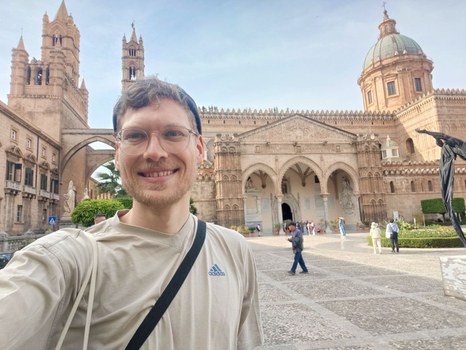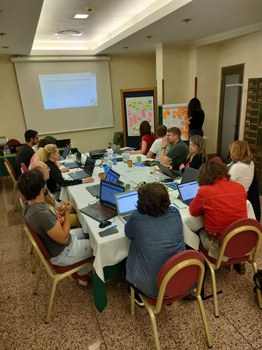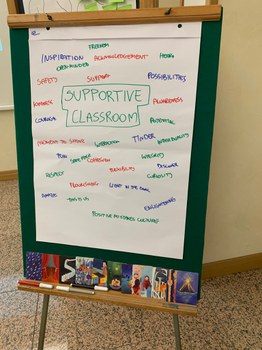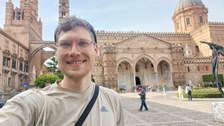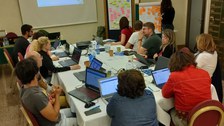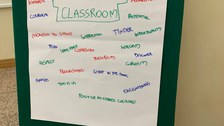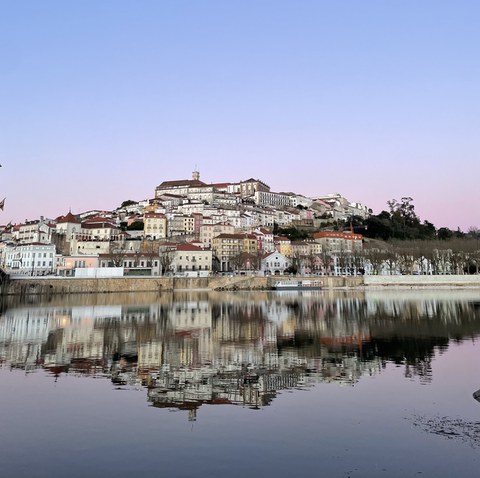...abroad - gain international experience
Stays abroad and semesters abroad are also possible as part of the WBF/OE. Below you will find experience reports from students who have completed a semester or internship abroad as part of the Master's program:
Table of contents
Erasmus Learning Academy (SoSe24)
The student Julius Holling completed his compulsory internship as part of the WBF/OE as an internship abroad at the Erasmus Learning Academy in Palermo, Italy and reports the following:
I was in Palermo for the WBF/OE internship at the Erasmus Learning Academy. The organization runs international training courses on various pedagogical and didactic topics for teachers from Europe.
My main task was to accompany the courses. This included supporting the trainers, helping the participants and documenting the learning process. From time to time, I was also able to lead my own course units. I also carried out the cultural activities, which meant taking the groups on guided tours of the sights of Palermo.
I came across the internship position via the Erasmus Student Network (ESN) internship platform. There were some interesting offers in Italy under the search term "education". The internships offered there have the advantage that the working language is usually English. I had already learned basic Italian in the language courses at TU Dresden, but this was not absolutely necessary for my internship.
Once I had been accepted for the internship, I was able to apply for Erasmus funding for internships abroad. The application process was not particularly difficult. There are no application deadlines for internship funding, but you shouldn't apply too late. I applied in November and for me the funding pot for the period was almost exhausted.
The internship fulfilled my expectations in several ways. Firstly, I was able to gain valuable practical experience as a trainer. Thanks to the weekly changes in course content, I received a lot of input and got to know new methods. Secondly, I was able to accompany a new international group every week and thus observe very different group dynamics. Of course, I also got to know a lot of interesting people as a result.
Not to be neglected is the fact that the internship gave me the opportunity to discover the lively city of Palermo, travel around Sicily, go hiking and experience a wonderfully warm spring.
Unfortunately, my expectations of improving my Italian were not fulfilled. During the internship, I only spoke English and I also had difficulties understanding the Sicilian dialect.
I found it difficult to make contact with local people outside of the internship. I got on very well with my colleagues and we also met up privately from time to time. However, I spent most of my free time alone, which was okay for the limited duration. Nevertheless, next time I would try to get to know other people right from the start through flatmates, a hobby or other events (at the university, in the theater or in the café next door).
Universidade de Combria in Portugal
Our student Jessica Gollman completed a semester abroad in Portugal and reports on her experiences at the Universidade de Combria. She was in the 4th semester of the Master's program through the Faculty of Education.
Ich habe mein Auslandssemester an der Universidade de Coimbra in Portugal absolviert. Ich wusste damals nicht, dass wir uns auch an anderen Fakultäten auf Restplätze bewerben können, weshalb ich nur bei der Fakultät Erziehungswissenschaften nach Partneruniversitäten geschaut habe. Das ist das großartige an unserem Studiengang, dass er so interdisziplinär ist und uns Türen in andere Fachbereiche eröffnet. So konnten Komiliton:innen über Psychologie oder Wirtschaftswissenschaften nach Chile oder Frankreich. Mich hat damals tatsächlich nur Portugal als Zielland interessiert, da mich das Land schon immer auch als Reiseland interessierte. Zudem wusste ich von einem Mädchen aus dem WBF/OE Jahrgang über mir, dass sie damals auch nach Coimbra wollte. Da ich nichts über Portugals Bildungssystem wusste (Erfahrungen konnte ich bereits in Frankreich und England sammeln), interessierte mich Portugal auch deshalb.
Der wichtigste Faktor für mich war die Finanzierung. Ich wollte und konnte nur mit einer Erasmus-Förderung ins Ausland. Hätte ich mich auf ein Stipendium (für nicht-europäisches Ausland) bewerben müssen, was ich am Ende nicht bekommen hätte, wäre der Aufenthalt nicht möglich gewesen. Dadurch, dass ich Arbeiterkind bin, habe ich eine zusätzliche Förderung erhalten und konnte außerdem weiterhin remote arbeiten. Ich musste folglich erstmal die gesamte Finanzierung abklären. Neben der ganzen Bewerbung im Mobility Portal, musste ich dann noch (gefühlt alle Schritte) in einem Portal der portugiesischen Universität wiederholen. Das hat teilweise auch viel zu Verwirrung gesorgt. Ich habe mir zwar keine Leistungen anrechnen lassen, da ich nur noch die MA und den Praktikumsbericht offen hatte, dennoch hat das Learning Agreement sehr lange, viel Zeit und Arbeit in Anspruch genommen. Um einen reibungslosen Ablauf zu gewährleisten, sollte man sich schon etwas eher mit allem beschäftigen und schauen, was gebraucht wird. Ich habe ein Jahr vorher auch mit einem Sprachkurs angefangen. Prinzipiell habe ich mich aber auch „auf den letzten Drücker“ beworben und hatte nur entspannt Zeit, da ich mich für das Sommersemester bewarb und dadurch gab es mehr Vorlaufzeit.
Ich bin kaum mit Erwartungen gestartet, außer, dass ich meine Entscheidung hoffentlich nicht bereue. Jetzt kann ich sagen, dass ich sofort wieder die Entscheidung treffen würde. Ich habe so tolle Freundschaften geschlossen, bin weiter an mir gewachsen und konnte eine beeindruckende Universität kennenlernen. Die Universidade de Coimbra hat sehr viele alte, interessante Traditionen. Viele dieser Traditionen gestalten ein buntes, lebendiges Studentenleben, was man hier in Deutschland nicht ansatzweise kennt. Die Mentalität ist in Portugal anders und somit auch das Verhältnis zu den Professor:innen. Vielleicht waren es auch nur meine Professor:innen, aber ich habe erlebt, wie offen, hilfsbereit und familiär sie sind. Als meine eine Professorin erfuhr, dass ein Erasmus-Studierender lange krank war, hat sie gefragt, ob er Unterstützung benötigt oder sie einen Arzt empfehlen kann. Jeder bot an, nach der Stunde nicht verstandene Inhalte besprechen zu können. Ungewohnt war die Länge der Vorlesungen, 2-3h waren üblich. Ich habe folgende Seminare besucht: Leadership and Motivation, Project management, Portuguese class, desafiliated citizens.
Informiert euch, ob es Vereine oder Gruppen gibt (z.B. ESN), die Veranstaltungen für Erasmus-Studierende organisieren. So habe ich am Anfang die meisten Personen kennengelernt. Es gab WhatsApp Gruppen, in denen von alten Semestlern Sachen verkauft wurden, die nach einem Semester nicht mehr benötigt wurden, Fahrgruppen wurden gebildet (manche sind mit dem Auto nach Portugal gefahren) oder die ersten Unternehmungen wurden geplant. Man kann sich am Anfang allein fühlen, letztendlich ist nicht für alle die Erfahrung gleich, aber sobald man paar Freundschaften geschlossen hat, wird es eine tolle Erfahrung. Versucht in das Uni-Leben einzutauchen und nicht nur ein Langzeit-Tourist zu sein, das macht die Erfahrung authentischer

